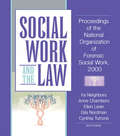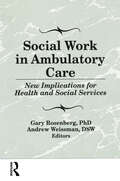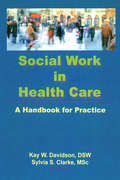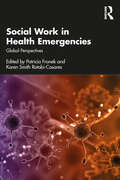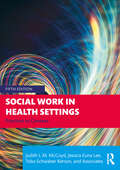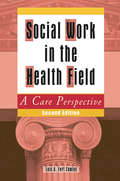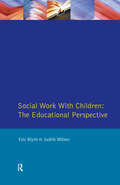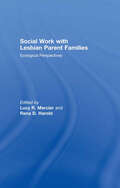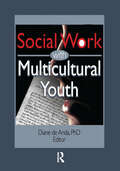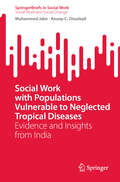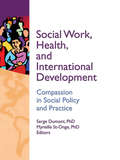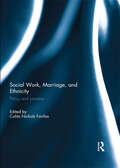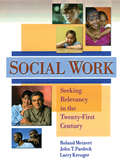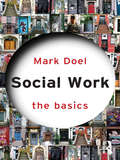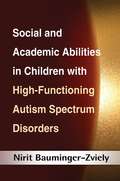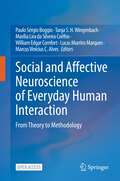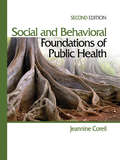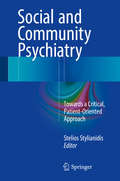- Table View
- List View
Social Work and the Law: Proceedings of the National Organization of Forensic Social Work, 2000
by Anne Chambers Ira Arthell Neighbors Ellen Levin Gila Nordman Cynthia TutroneExamine cutting-edge research on the social worker’s role in the legal system!Social Work and the Law: Proceedings of the National Organization of Forensic Social Work, 2000 addresses the issues and concerns facing social workers who deal with law and the legal system. This comprehensive research collection is essential for providing diagnosis, treatment, and recommendations on legal issues and litigation, both criminal and civil. The findings are invaluable for social workers called upon for consultation, education, and training insights when dealing with legal personnel.As the relatively new field of forensic social work grows, the issues related to its expansion become more complex. Social Work and the Law presents thoughtful commentary on those issues, taken from cutting-edge research findings on the links between animal, child, and domestic abuse; the psychology of stalkers (and their targets); empowering the drug courts; determining competency to stand trial; and much more! Vital for social work practitioners, the book is also an important resource for medical, legal, and criminal justice professionals, educators, and counselors.Social Work and the Law is a valuable guide for anyone dealing with: the assessment and treatment of criminal and juvenile justice populations the civil rights of the mentally ill and mentally impaired the social work aspects of marriage, divorce, and annulment the termination of parental rights and much more!More and more, social workers will need legal knowledge as they advocate for clients who have legal problems and/or are involved in the judicial system. Social Work and the Law provides essential information on dealing with issues confronted by the civil and criminal justice systems.
Social Work in Ambulatory Care: New Implications for Health and Social Services
by Gary RosenbergThe contributing authors of this volume--respected authorities on health care and social work--describe the shift from hospital based care to ambulatory patient and family focused community based services. Social Work in Ambulatory Care assists readers who need to develop, plan, and implement new social work roles for a changing health care system. Chapters focus on the implications of health care reform, based on policy or economic mandates, and provide specific examples of how social service providers can approach health care in a new era.As the authors describe the shift in health care to ambulatory care and the role of social work in this new environment, they cover areas of potential concern to social service providers. Readers will be challenged to plan new social work roles in the future--roles that help advance social work’s own definitions of health and wellness. Specific examples of creative roles for social work are described and several of the most important areas this guidebook analyzes are: the health care system under siege support groups managed care emergency room community based careFor social workers in health settings, struggling with the questions of relevance, growth, and worth in a changing environment, Social Work in Ambulatory Care provokes new ideas about health care for the future.
Social Work in Child Care (Routledge Revivals)
by Elisabeth PughIn the late 1960s the child care service had undergone considerable change, and was to change again after the Seebohm Committee had reported. Yet its central tasks had become clear: preventive work; the reception of children into care, work with them and their parents during the period of care; the selection of foster parents; work with foster parents, and with residential staff; and adoption. Originally published in 1968, the present work devotes a chapter to each of these important tasks, and examines the role of the child care staff within the local authority department at the time, though many of the arguments of the book will also be applicable to the work of the voluntary child care organisations of the day.
Social Work in Health Care: A Handbook for Practice (Social Work In Health Care Ser. #Vol. 12, No. 3)
by Kay DavidsonHere is an outstanding reference book of major readings in the field of social work in health care. Practitioners, educators, researchers, and students can use this landmark two-part volume to review dominant themes and critical issues in today’s practice environment and to understand the evolution of current trends and emerging policies and programs. In this one desktop source book, hundreds of references relevant to the health care social work field are immediately accessible. Education, policy, practice, and research issues integral to social work’s expanding role in health care are the main focus, with each chapter highlighting a theme of enduring importance to the field. Other outstanding articles related to the chapter’s theme are cited in the appendix to each chapter which also includes a selected bibliography of suggested topical readings. Comprehensive new book filled with information vital to social workers in the health care field! Over 900 pages of scholarly articles by the foremost social work leaders in health care! 9 categories embrace the range of social work activity in the health care field! Exciting new ideas and practical suggestions for everyday dilemmas! Hundreds of references immediately accessible in one desktop source! Selected bibliography of topical headings provides sources for even more relevant articles! A MUST HAVE volume for instructors and students! Deepen your understanding of all aspects of social work practice in health care with this superb volume! Here is an outstanding reference book of major readings in the field of social work in health care. Practitioners, educators, researchers, and students can use this landmark two-part volume to review dominant themes and critical issues in today’s practice environment and to understand the evolution of current trends and emerging policies and programs. Social Work in Health Care makes hundreds of references relevant to the health care social work field immediately accessible in this one desktop source book. Education, policy, practice, and research issues integral to social work’s expanding role in health care are the main focus, with each chapter highlighting a theme of enduring importance to the field. Other outstanding articles related to the chapter’s theme are cited in the appendix to each chapter which also includes a selected bibliography of suggested topical readings. Find answers and ideas for everyday dilemmas in this all-inclusive, information-packed volume!Social workers practicing in the rapidly expanding health care field call upon a repertoire of skills to fulfill a variety of functions including direct patient care and contact with patients’families, education, and influencing organizational policies on their clients’behalf. The in-depth scholarship and the diversity of multiple approaches to health care social work, as presented in Social Work in Health Care, will have a strong impact on the field. Through the intertwining network of education, policy, practice, and research issues in the book, and professsional discussion of those topics, a beginning point exists from which social workers can develop principles to guide their social work activities in the medical and health fields.
Social Work in Health Emergencies: Global Perspectives
by Patricia FronekThis is the first comprehensive book that provides accessible, international knowledge for practitioners, students and academics about social work in health emergencies and spans fields of practice across world regions with particular reference to the COVID-19 pandemic. Divided into three sections: • Regional, Historical and Social Work Perspectives takes a journey through world regions during the first six months of the pandemic as it unfolded, explores the lessons found in the history of pandemics and situates public health social work practice in the values of the profession. Situating the diversity of challenges and opportunities in context, in turn, influences current and future social work practice. • Social Work Practice, Issues and Responses explores social work practice innovations and responses across eleven key practice fields. International authors feature social work responses during the COVID-19 health emergency from different regions of the world. • Preparing for the Future analyses broader concepts, innovations and the implications for future practices as social work enters a new era of service delivery. The 20 chapters explore the convergence of pandemic, politics and planet which is critiqued within a framework of the profession’s ethics and values of human dignity, human rights and social justice. Social work’s place in public health is firmly situated and built on the premise that the value social work brings to the table deserves recognition and should be documented to inform the development of the profession and future practice and how social work must carry lessons forward to prepare for the next pandemic. The book is relevant to a wide range of audiences, including practitioners, educators and students in social work, human services, international development and public health, as well as policy makers and researchers.
Social Work in Health Settings: Practice in Context
by Toba Schwaber Kerson Judith L.M. McCoyd Jessica Euna LeeThis fully revised and expanded fifth edition of Social Work in Health Settings: Practice in Context maintains its use of the Practice-in-Context (PiC) decision-making framework to explore a wide range of social work services in healthcare settings. The PiC is updated in this edition to attend to social determinants of health and structural conditions. The PiC framework is applied in over 30 case chapters to reflect varied health and social care settings with multiple populations. Fully updated to reflect the landscape of healthcare provision in the US since the Affordable Care Act was reaffirmed in 2020, the cases are grounded by "primer" chapters to illustrate the necessary decisional and foundational skills for best practices in social work in health settings. The cases cover micro through macro level work with individuals, families, groups, and communities across the life course. The PiC framework helps maintain focus on each of the practice decisions a social worker must make when working with a variety of clients (including military veterans, refugees, LGBTQ+ clients). The ideal textbook for social work in healthcare and clinical social work classes, this thought-provoking volume thoroughly integrates social work theory and practice and provides an excellent opportunity for understanding particular techniques and interventions.
Social Work in the Health Field: A Care Perspective, Second Edition
by Lois A CowlesThis book provides an introduction to social work practice in the field of health care. It addresses both physical and mental health, examines various settings such as primary care, home care, hospice, and nursing, and also provides histories of social work practice in traditional industry segments.
Social Work in the Hospital Organization
by Margaret Gaughan BrockThis book was written to fill a need for a basic text about medical social work. The material has specific reference to social work in the hospital organization, but much of it is applicable to social work within the broader context of health care.Any printed material now available on the subject is largely incidental and scattered reference. This book will be of great value to social workers, and to students in hospital administration, medicine, and nursing. It will also be of help to members of hospital boards and to hospital administrators who wish to establish or evaluate a social service department.Beginning with a background in the history of the hospital and social work, the book provides chapters on the role and function of a social service department in a hospital, on the staffing and administration of such a department, on the kinds of activity in which it engages, and on its place in the larger organization of which it is a part.
Social Work with Adolescents (Routledge Library Editions: The Adolescent)
by Ray Jones Colin PritchardOriginally published in 1980, this was the first book to provide a wide-ranging discussion of social work with adolescents, and is composed of linked original papers by the Social Work Group and their associates at the University of Bath. The contributors discuss adolescent development and the experience of adolescents and focus on what social workers might actually do with and for these young people. Following a general discussion of social work method, using the framework provided by systems theory, there is exploration of counselling with the adolescent and his family, group work and neighbourhood work with adolescents, and the residential care of adolescents. In addition, the book examines issues of interprofessional co-operation between the services provided for adolescents, and discusses some of the personal issues which confront the social worker who works with young people.
Social Work with Children: The Educational Perspective
by Judith Milner Eric BlythThe recent review of the Diploma in Social Work highlighted the fact that children and young people who are in care have less successsful records of educational achievement than their peers. Social Work with Children encourages students to view the educational experiences of the young people they will work with seriously and to provide them with the necessary information to do so with confidence and authority. It takes account of the problems asssociated with inter-agency and inter-professional work drawing upon the authors own practical experience and research. Illustrative case studies are provided.
Social Work with Immigrants (Routledge Revivals)
by Juliet CheethamPeople whose work brings them into contact with immigrants and their families are concerned about the serious personal and social problems they may face in establishing themselves in Britain. Originally published in 1972, Juliet Cheetham here explores the origin and nature of these difficulties and discusses the contributions and limitations of social work in meeting the needs of immigrants, their relatives and some of the organizations involved with them at the time. Drawing on her own field experience, the author deals with fundamental issues in race relations, together with the problems of poor urban areas in which most immigrants have settled. She also considers the backgrounds of some of the main immigrant groups, their family structure, and the pressures and anxieties they experience in moving into a new environment. She examines as well the special skills and understanding that social workers in this field need to develop. This is a perceptive study which raised fundamental questions about the values, objectives and methods of social work at the time. Even today it will also provide social workers with a stimulus to re-think the basis of some of their activities. This book is a re-issue originally published in 1972. The language used, and assumptions made, are a reflection of its era and no offence is meant by the Publishers to any reader by this re-publication.
Social Work with Lesbian Parent Families: Ecological Perspectives
by Rena D. Harold Lucy R. MercierThe traditional concept of family as being exclusively heterosexual has resulted in myth-generation about lesbian parents as well as fostering limitations in the programs and benefits that support more diverse nontraditional families. Social Work with Lesbian Parent Families: Ecological Perspectives explores the variety of social systems with which lesbian parent families interact, with a focus on implications for improved, diversity-affirming service delivery and policy development. Unlike other literature on lesbian parent families, this revealing resource pulls together work on lesbian parenting from various researchers across a broad range of disciplines and presents this work from the ecosystems perspective so that the reader may view the experiences of lesbian parent families in a holistic way. The research goes beyond simple comparisons between lesbian and straight mothers. This useful text provides more complex research data, including both a more sophisticated view of the diverse communities in which lesbian parents are found, and more innovative ways of studying the issues relevant to social service providers. Developmental and life issues negotiated by lesbian parent families are discussed in detail using a strengths-based approach to intervention with individuals, families, small groups, communities, and larger systems. This unique book has the strong potential to influence the policies that impact lesbian parent families.Social Work with Lesbian Parent Families: Ecological Perspectives is a valuable resource for social workers, psychologists, sociologists, anthropologists, marriage and family therapists, public policy and administration professionals, students, and academics doing research on sexual orientation and family.This book was published as a special issue of the Journal of Gay & Lesbian Social Services.
Social Work with Multicultural Youth
by Diane DeandaExplore the cultural, familial, and community resilience and protective factors that are available to different youth populations in the U.S.! The face of American youth is changing. In 2000, ethnic minority youth constituted one third of the adolescent population; by mid-century, the combined ethnic minority youth population will exceed the white adolescent population. This vital book illustrates the diversity within the adolescent population, examines the factors that serve as barriers and as facilitators to development, and identifies strengths and protective factors contributing to resilience as well as needs and risk factors. Social Work with Multicultural Youth presents accurate conceptual frameworks for understanding the experiences of ethnic youth to help you create culturally relevant interventions to promote their well-being. Here is a sample of what you'll find in this important and informative book: a comprehensive epidemiological profile of adolescent populations-with current data on issues that contribute to adolescents' health and well-being cultural strengths models and resilience models that meet the developmental needs of Latino and African-American youth an overview of the academic disparities between Latina adolescents and their cohorts in other ethnic groups an important chapter that employs conflict theory to place the disadvantaged status and position of African-American youth in its proper context specific recommendations for modifying the process of preparing Latino and African-American youth in foster care for emancipation information on factors that differentially impact academic achievement between African-American youth and their European-American cohorts real-world data about the "who" and "where" of adolescent fighting-identified by race/ethnicity, gender, and age new information about substance use in Asian/Pacific Islander populations in America, with important implications for substance abuse interventions resilience and protective factors that emerge from a qualitative study of seventh grade Latina adolescents a look at the differences in sexual behavior and attitudes between Latina adolescents born in the United States and those born outside the U.S. an evaluation of a unique, five-hour intensive intervention aimed at changing the knowledge and attitudes of Latino youth in regard to pregnancy and STDs
Social Work with Populations Vulnerable to Neglected Tropical Diseases: Evidence and Insights from India (SpringerBriefs in Social Work)
by Muhammed Jabir Anoop C. ChoolayilThis book discusses the need to establish social work for Neglected Tropical Diseases (NTDs) with an emphasis on the emerging role of effective and sustainable social interventions for the control and elimination of NTDs. NTDs are a group of infectious diseases prevalent in tropical and subtropical regions, causing significant morbidity and mortality to the world's poorest populations but receiving relatively lesser attention. They significantly affect communities with poor financial resources, inadequate sanitation and limited healthcare facilities, indicating their social dimension. Addressing NTDs requires multifaceted strategies that consider environmental, social, and economic factors, with socioeconomic factors emerging as a critical determinant. The global battle against NTDs has seen significant progress, yet social workers’ involvement remains limited, particularly in high-prevalence regions like India. This stems from undefined roles and a lack of focus within existing NTD frameworks. Integrating social work into NTD intervention is crucial for addressing the diverse challenges associated with these diseases, especially the social dimensions. Social workers, by advocating for health equity, engaging communities, addressing social determinants, and collaborating with healthcare professionals, can contribute significantly to the broader efforts in mitigating the impact of NTDs on vulnerable populations. This book builds on the social nature of NTDs to argue for the case of NTD social work. Establishing NTD social work requires efforts in training, standardising practices, research, advocacy, infrastructure development, and partnerships. Among the topics covered: Neglected Tropical Diseases: A Brief Introduction to the Global Scenario Neglected Tropical Diseases and the Social Dimension of Illness in India Social Work for the Control and Elimination of Neglected Tropical Diseases Towards Sustainable Impact: Future Directions in Social Work for NTD Control and Elimination Social Work with Populations Vulnerable to Neglected Tropical Diseases helps readers to understand the intersectional nature of health inequities and effectively work towards the control and elimination of diseases of poverty, specifically NTDs. The book is useful reading for health social workers, social work educators, healthcare professionals, medical and public health educators, and public policy and health policy researchers.
Social Work, Health and Equality (The\state Of Welfare Ser.)
by Paul Bywaters Eileen McLeodWhat impact can social work make on inequalities in health? Social Work, Health and Equality opens up a new direction in the practice and theory of social work. Focussing on the profound human suffering which arises from social inequalities in health, it: * shows how social work can make a significant contribution to creating more equal experiences of health and illness * describes the major shifts in conceptualisation, practice and organisation necessary to bring about change. The authors explore these questions in relation to four key aspects of health; health maintenance, illness at home, hospitalisation, and facing death. Grounding the text in everyday lived experience, they show how social work must change its discourse and its practice if it is to respond effectively to the challenges of its new role in tackling health issues.
Social Work, Health, and International Development: Compassion in Social Policy and Practice
by Serge Dumont Myreille St-OngeSharpen your social work in health care knowledge and skillsSocial Work, Health, and International Development: Compassion in Social Policy and Practice presents leading international experts from a range of disciplines providing the latest in research, theory, and practical solutions to advance social work in health care issues. Readers get a refreshed view on ways to put social policy into a compassionate and empathetic framework with strategies to more effectively meet today's challenges in social work and health care. This superb selection of papers from the Fourth International Conference on Social Work in Health and Mental Health held in Quebec provides a unique perspective on social work and the development of a more compassionate world.Social Work, Health, and International Development: Compassion in Social Policy and Practice focuses on areas essential to every social worker no matter where they practice. The book explores the increased importance of compassion and solidarity among social workers, the essential need to effectively address the HIV/AIDS pandemic, strategies to more fully address aging issues, and best practices. The latest research findings and data are discussed to modify approaches and revitalize the field, all to help the world become a more caring, compassionate place.Topics in Social Work, Health, and International Development: Compassion in Social Policy and Practice include: social work interventions to lead needy countries from health to economic growth the concept of solidarity as a fundamental notion in social work the need to revisit social work’s ethical foundations cultural competence in responding to the HIV/AIDS pandemic a comprehensive action plan to deal with HIV/AIDS a study on grandparents’ caring for children of AIDS victims multilevel interventions to promote elderly people’s mental health forming partnerships that promote the diverse voices of older people recognizing deficiencies to increase cultural competency in staff “best practice” case management approach to improve patient adherence to care Internet-based intervention for caregivers of persons with dementia dyadic peer support pilot intervention for parents of children with lung disease continual education for increased professional competence much more!Social Work, Health, and International Development is invaluable reading for social workers, health practitioners, researchers, and clinicians.
Social Work, Law and Ethics (Student Social Work)
by Jonathan DickensLaw and ethics are two vital aspects of social work – all social workers need to practise according to the law and their codes of ethics and conduct. However, the relationship between the law and social work values and ethics is not without its tensions and this book takes a problem-based approach to explore the dilemmas and challenges that can arise. The first part of the book sets out frameworks for thinking about the law and ethics, and how they relate to social work. It also introduces some of the big philosophical and sociological questions about the purposes of law and of ethics and how they relate to society more generally. In the second part, the book explores a series of areas where profound dilemmas arise – such as end-of-life decisions, respecting peoples’ choices but ensuring their safety and that of others, responsibility and blame, making allowance for different cultural traditions and breaking confidentiality. In each of the problem-based chapters, this accessible text: outlines the relevant law discusses court judgments in leading cases considers the implications of different ethical frameworks pulls out key ethical questions and challenges for social work. Social Work, Law and Ethics highlights what the law says and what it offers, what ethical principles are at stake, and what these imply for social work policy and practice. In this way, it uses real-life scenarios to analyse the dynamic interactions of social work, law and ethics. It is essential reading for all social work students.
Social Work, Marriage, and Ethnicity: Policy and Practice
by Colita Nichols FairfaxBy looking at a variety of racial and ethnic groups in society, Social Work, Marriage and Ethnicity examines the conventional knowledge, theories and best practices relating to marriages. Contributors address marriage interventions, female empowerment, parenting, and cohabitation, as well as the variables which impact these situations, such as employment, housing, domestic violence and HIV/AIDS, within appropriate and meaningful cultural contexts. This book will be particularly useful for social workers working in many settings: clinical, community, research, policy implementation, faith-based, and other arenas that are available to couples in need of marital support. Marriage issues need to be addressed by social workers, given its status as a vital element in family strengthening and relationship stability. This book emboldens the case manager, community organizer, or immigration officer to address marital stresses and the demands faced by those couples most impacted by systemic inequality and barriers to cultural interventions. This book was originally published as a special issue of the Journal of Human Behavior in the Social Environment.
Social Work: Seeking Relevancy in the Twenty-First Century
by Jean A Pardeck Roland Meinert Larry W KreugerDiscover why social work must be restructured if it is to remain viable!Social Work: Seeking Relevancy in the Twenty-First Century provides you with a critical examination of the major issues that social work education and practice must confront if social work is to remain as a mainline profession. The book explores issues that are not normally covered in social work literature, such as the challenge of reconstructing the social work profession, the use of technology in social work, and the tension surrounding various social work education curriculums. You will benefit from this thorough discussion of the many problems that the social work profession is facing: a lack of scholarly research, inadequate educational programs, and the use of hypertechnology to educate social work students.Social Work: Seeking Relevancy in the Twenty-First Century examines the epistemological, theoretical, socio/technical, and practice directions that social work has branched into. You'll discover that today's central direction for social work is generated from liberal, postmodern, and increasingly feminist ideological perspectives. In a field where conceptual and theoretical input rarely allow for intellectual diversity, this volume demonstrates that several views are best for inquiry and exploration in social work.Issues discussed include: examining real or unreal social work values by separating them from beliefs, preferences, norms, attitudes, and opinions creating social work course outlines that incorporate practices developed around the globe, allowing for more conceptual and theoretical growth within the field realizing the tremendous difference between communication in the instrumental sense via technology, and in the affective, soul-oriented sense via personal interaction investigating the negative effects of communicating with hypertechnology (modems, e-mail) in the social work profession realizing the need for a greater quantity and quality of social work research to progress further in the fieldSocial Work: Seeking Relevancy in the Twenty-First Century invites you to reinvent social work for today's post-industrial and post-modern era. You will discover a series of challenges that social work must meet and overcome if it is to move into the new century as a relevant and viable profession. You will explore solutions such as increasing scholarship and research among social workers, and decreasing the use of technology (for example, classes held via the Internet) in social work education programs in order to increase the quality of the social work profession.
Social Work: The Basics (The Basics)
by Mark DoelSocial Work: The Basics is an insightful introduction to the often misrepresented world of social work. This accessible book presents a broad view of contemporary social work, exploring its roots and its possible future. It dispels myths surrounding social work, addresses media debates, and offers a balanced account of what social workers do. The book argues for a social work that is partisan in support of social justice. Questions covered include: How did social work arise? How and why do people come into contact with social workers? What are the true aims of social work - to help or to control? What is the relationship between social work and social policy? How and why do people become social workers? What’s it like to be a social worker? Can social work cross borders? Drawing examples from the full range of social work practice, this book is valuable reading for all individuals interested in the field of social work. It will provide a helpful introduction for students considering a career in social work, those beginning social work courses, and other professionals whose work brings them into contact with social workers and who want to find out more about what social work is.
Social Work: Voices from the inside (Student Social Work Ser.)
by Ann Davis Viviene E. CreeSocial Work: Voices from the Inside offers unique insight into social work from the perspectives of those ‘on the inside’, that is, service users, carers and practitioners. Drawing on a narrative tradition, fifty-nine people from across the UK tell their stories about how and why social work came into their lives, and what happened next. Key topics are discussed, including: children and family social work criminal justice social work mental health social work residential child care social work with disabled people social work with older people lessons for the future. Focusing on issues for good practice in social work and social work education, this book is essential reading for students and academics of social work and social policy. It will also appeal to social work professionals and those in allied health, education and care areas.
Social and Academic Abilities in Children with High-Functioning Autism Spectrum Disorders
by Nirit Bauminger-ZvielyA uniquely comprehensive resource for practitioners, this research-based book addresses both the social-emotional and cognitive-academic challenges faced by children and adolescents with high-functioning autism spectrum disorders (HFASD). The author traces these kids' developmental trajectories and explores their distinct combination of strengths and needs. Effective school-based interventions for overcoming the social isolation and learning difficulties often associated with HFASD are reviewed in depth. Appendices include concise descriptions of more than 50 relevant assessment tools, plus a detailed, practical outline of the author's empirically supported social intervention model. E-book purchasers can download and print the tables from the Appendices at the companion Web page.
Social and Affective Neuroscience of Everyday Human Interaction: From Theory to Methodology
by Paulo Sérgio Boggio Tanja S. H. Wingenbach Marília Lira da Silveira Coêlho William Edgar Comfort Lucas Murrins Marques Marcus Vinicius C. AlvesThis Open Access book presents the current state of the art knowledge on social and affective neuroscience based on empirical findings. This volume is divided into several sections first guiding the reader through important theoretical topics within affective neuroscience, social neuroscience and moral emotions, and clinical neuroscience. Each chapter addresses everyday social interactions and various aspects of social interactions from a different angle taking the reader on a diverse journey. The last section of the book is of methodological nature. Basic information is presented for the reader to learn about common methodologies used in neuroscience alongside advanced input to deepen the understanding and usability of these methods in social and affective neuroscience for more experienced readers.
Social and Behavioral Foundations of Public Health
by M. Marie CoreilEmphasizing the importance of social context and cultural construction, Social and Behavioral Foundations of Public Health examines current issues in health from a social and behavioral sciences perspective. The book uses a social ecological framework to address multilevel influences on health and enlarge the dominant "risk factor" approach to health behavior. Editor Jeannine Coreil and contributing authors use examples from the forefront of public health to illustrate the relevance of "core"competencies" in the field to diverse real-world problems. The Second Edition has been thoroughly updated and revised throughout, based on user feedback, and includes new theory, research, case studies. Key Features: Applies the social ecology of health model to contemporary issues at the individual and group level Draws from a wide range of disciplines, including medical sociology, health psychology, medical anthropology, demography, gerontology, and economics Describes planning, implementation, and evaluation of public health programs, policies, and interventions Features engaging case studies and examples on topics such as HIV/AIDS and breast cancer Includes new "Special Topics" section, with chapters on childhood obesity, injury prevention, and occupational health Offers practical advice for students and practitioners interested in updating their knowledge and skills" Social and Behavioral Foundations of Public Health is intended as a core textbook for graduate courses in public health and health care management that examine current issues in health from a social and behavioral sciences perspective.
Social and Community Psychiatry
by Stelios StylianidisThis book presents the basic theoretical and historical concepts and it describes current perspectives and data, focusing on good practices in community psychiatry in Greece and in other parts of Europe. Concepts such as the biopsychosocial model, psychiatric reform, psychosocial rehabilitation and the recovery model, as well as new case management models are approached from a critical, anthropocentric perspective. The current socioeconomic crisis in Europe brings with it new realities in mental health systems. New forms of social suffering are forcing the psychiatric community to re-examine what is considered normal. In order to respond to the complexity of the newly emerging needs, social and community psychiatry has been compelled to broaden the objectives of intervention and research alike, developing new and dynamic relations with complementary scientific fields such as social anthropology, psychoanalysis and microeconomics. The present work is the result of collaboration between professionals from across these different fields.
